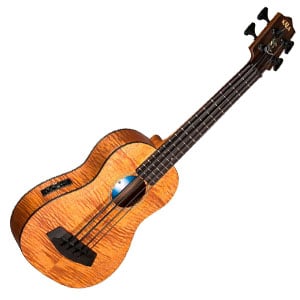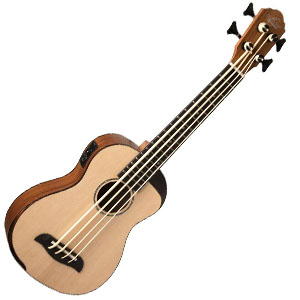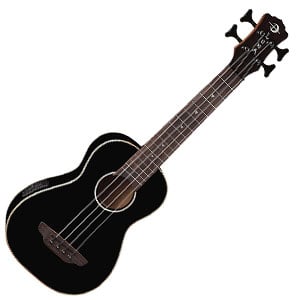Top 5 Bass Ukuleles A Completely Different Beast
We may also earn commissions on purchases from other retail websites.
Last Updated: May-07-2019
Although a relatively new page to the site, we still gave this ukulele bass chart a revisit. Thankfully, our original recommendations still stood up to scrutiny, so we didn't change anything apart from a few tweaks to the article. Check back again soon!
Ukuleles have jumped back into the mainstream in recent years. While that attracted more attention to this awesome instrument, it has revealed some of the ukulele’s lesser-known niche cousins, such as the banjolele and the lap steel ukulele.
However, today it’s all about the bass ukulele!
In our chart below, we are going to highlight our top ukulele bass picks, before spending some time discussing what bass ukuleles are all about in our short guide.If you are a fan of that classic uke sound, but fancy a little more low-end oomph, then chances are you’ll love this modern instrument. Let’s get this show on the road!
5 Best Bass Ukuleles
| Image | Ukuleles / Rating | Summary | Check Price |
|---|---|---|---|
+ -  | Kala U Bass Total of 4.80/5 | Awesome looks combined with functional design and performance that's hard to match. | |
+ -  | Oscar Schmidt Comfort Total of 4.70/5 | Awesome bass uke coming from a brand that is quickly establishing itself. | |
+ -  | Donner Ubass DUB1 Total of 4.55/5 | A true hidden gem found in the affordable segment of the market. | |
+ -  | Luna Guitars Bass Ukulele Total of 4.65/5 | A somewhat unusual but ultimately awesome bass ukulele with plenty to offer. | |
+ -  | Hadean UKB23 Total of 4.58/5 | One of the proven best budget options on the market right now. |
Kala U Bass

| Body And Neck: |  |
| Hardware: |  |
| Sound: |  |
| Value: |  |
When you go out there to get yourself a ukulele, Kala is one of the few names that will jump at your from everywhere. Their reputation is impressive and for a good reason.
This brand simply knows how to make a good uke without completely breaking your bank account. They also make less conventional versions of this instrument. Meet Kala U Bass. We're looking at a full mahogany build that packs a set of on board electronics.
Not only does it look good, but it sounds even better. Kala has managed to turn a ukulele chassis into something that produces a proper bass tone. Compared to most of its immediate competition, U Bass offers the best value for the money.
Oscar Schmidt Comfort

| Body And Neck: |  |
| Hardware: |  |
| Sound: |  |
| Value: |  |
For quite some time now, Oscar Schmidt has been a brand that filled in a very niche role. Their ability to deliver awesome bang for the buck instruments is impressive to say the least.
As it turns out, this role also extends to bass ukeleles. Even though Oscar Schmidt isn't really a brand often associated with ukes, they have proven their abilities numerous times by now. Oscar Schmidt Comfort Series bass uke features a solid spruce top over kao shell, a well balanced on board preamp and a great set of hardware.
On paper, it looks pretty good. However, once you handle it for the first time, whatever second thoughts you might have had will tend to disappear rather quickly.
Donner Ubass DUB1

| Body And Neck: |  |
| Hardware: |  |
| Sound: |  |
| Value: |  |
Digging deep into the affordable bass ukulele market, we tend to find a whole bunch of mediocre models. However, there are some hidden gems out there which will reward your time and effort. Donner DUB1 is absolutely one of them.
You are looking at a mahogany bass ukulele that features great hardware, versatile on board electronics, and most importantly, a reallygood tone. Donner has really done a lot to make this bass as a attractive as possible.
After spending even an hour with it, you will realize that they have indeed achieve that goal. This is an awesome model for anyone looking to get into bass ukuleles, but also for those who want a decent instrument on a budget.
Luna Guitars Bass Ukulele

| Body And Neck: |  |
| Hardware: |  |
| Sound: |  |
| Value: |  |
If you are familiar with the ukulele market, you've probably heard of Luna. It's that quirky brand that has a quite unique way of decorating their instruments. Their Luna Bass Ukulele features all of that quirkiness, but also some tangible potential.
With a spruce top, koa back and sides, it brings a pretty balanced tone profile to the table. This is only confirmed when you start playing it. On top of that, they have also included a rather decent built in preamp that allows you to experience the full potential of this bass uke in a plugged in setting.
As always, Luna delivered that trademark bang for the buck value which you won't generally find that often with other brands.
Hadean UKB23

| Body And Neck: |  |
| Hardware: |  |
| Sound: |  |
| Value: |  |
If you are trying to find a good bass ukulele on a budget, your options won't be that diverse. One of the proven choices out there comes in form of Hadean UKB23. This bass has a lot going for it, especially if you insist on doing moderate tone shaping.
Everything starts with a great walnut body that really accentuates those lows. Add to this a great set of hardware and you have an instrument that is extremely reliable. Tone wise, Hadean's use of walnut gives UKB23 a pretty unique tone signature.
The built in preamp with a three band EQ does a great job at capturing the authentic sound of the instrument, but also allows for plenty of organic tone shaping.
What Are Bass Ukuleles and Where Did They Come From?
Never heard of a bass ukulele before? Don’t worry – you’re not the only person! There’s a good reason that these instruments aren’t as widespread as the traditional ukulele, and that’s because they are relatively new.
The story starts back in the early 2000s, when a small American company called Road Toad decided to do something different. They wanted to keep the compact form factor of a ukulele, but give it some girth in the low end. The result was the bass ukulele.
Towards the end of the decade, the company teamed up with Kala – one of the leaders in the ukulele market – to develop the instrument. This resulted in the release of the now famous Kala U-Bass, which is still one of the most popular bass ukes over a decade later.
Since then, several other companies have developed their own versions of the instrument. This has been great for players, who now have a lot more choice.
How Exactly Does a Bass Ukulele Work?
Think about it – getting a low, deep sound requires either a large soundboard or a fairly long scale. It’s safe to say that neither of these can be found on the bass ukulele.
This is where we see one of the best examples of outside-the-box thinking in recent instrument design history. In order to get a deep bassy tone from a small ukulele body, new strings were invented. The innovation was in the density of the strings.
As standard steel bass strings simply couldn’t deliver the low-end required, Kala went with synthetic polyurethane strings. This rubber band-like material added enough density without completely changing the feel of the strings nor their dynamics.
The result? A string that can produce the desired low-end frequencies, while keeping the cost of the instrument reasonable.
However, there is a small issue here. Even with high-density synthetic strings, the instrument still struggles with low-volume issues. To solve this, most bass ukulele manufacturers add a pickup and preamp to their models. Unlike electro-acoustic guitars, electronics on bass ukes are not there for added versatility, but out of necessity.
The Issue of Strings
We have already mentioned that bass ukes use a completely different type of string to any other instrument. This comes with its own set of problems. While polyurethane strings definitely have the necessary density, they do feel quite rubbery and stretchy, which can be off-putting for some players.
There is an alternative. These comes in form of strings with a synthetic core that are wrapped with a copper shell. In terms of feedback and playing sensation, these hybrids are about as close as it gets to standard bass strings.
The downsides are that replacements strings are very expensive. If you think a high-end set of standard bass strings are doing a number on your bank account, bass uke strings will make that look like child’s play!
Another downside is the break-in period. These polyurethane strings take a very long time to break in. You are looking at around two weeks or so before they really settle. Before this, expect to do a lot of tuning to keep your bass uke sounding good. The plus is that these strings are very rugged and durable, so you shouldn’t need to change them too often.
What Does a Bass Ukulele Sound Like?
So far, we have painted a picture of an unusual instrument. On one hand, that compact body feels like it should deliver bright, soft soprano ukulele tones. But then you see those thick black strings and suddenly you think ‘this is going to sound dark!’
The truth is somewhere in between. Check out the following video for a demo of what a bass uke sounds like:
If we had to describe the sound of a bass uke, it would be that of a slightly limited upright bass. There’s no classic ukulele sparkle, but it still sounds quite upbeat.
As we have mentioned, while there is a resonator box, it’s not big enough to offer much volume. This is where those preamps come into play even more, especially if you are performing with or to others.
However, in an unplugged setting – such as a bedroom or campfire – your average bass ukulele will be able to carry its own weight quite nicely.
How to Pick the Best Bass Ukulele for You?
Not long ago, choosing a bass ukulele was very simple. You either chose one from the limited range of expensive models that were available… or you didn’t get one at all.
Thankfully, things are different today. For starters, there’s a much wider range of models to browse when buying. There are also several price ranges to choose from. You can still opt for a high-end bass uke, but you also have the choice of buying an affordable one as well.
The most important thing is to be able to differentiate a bass ukulele from a baritone ukulele. They are completely different instruments!
However, the two instruments are similar sizes and fairly similar in appearance, which may confuse new players. One surefire way to determine the instrument is to look at the strings. As we have established, bass uke strings are much thicker (and often black in color), compared to the thinner strings found on a baritone ukulele.
When you have settled on your price and ensured you aren’t accidentally buying a baritone instead (accidents do happen!), the next important thing is to settle on a bass uke that has a decent pickup and preamp. You want something that replicates the uke’s natural tone as closely as possible.
All of the bass ukes on our list above have good electronics for their respective price ranges. Some even feature a full 3-band EQ. While tone shaping controls don’t necessarily dictate how good or bad a preamp is, this flexibility is often very handy.
Difference in Technique
How do you actually play a bass ukulele? Traditional fingerpicking styles definitely work and are successfully used by many. However, there’s an argument to be made for jumping straight to standard bass technique right away.
You will find it to be more natural in the long run, and it fits the profile of the instrument fairly well. The toughest thing tends to be finding a decent hand position that allows you to keep the instrument stable while playing. Ultimately, it’s up to you to experiment and find what works.
The Final Word
Bass ukuleles may be the new kid when it comes to the ukulele market, and even acoustic instruments in general. However, they have proven that they have a use and that the demand is there. This is good news because more manufacturers will get involved, which will result in more choice and lower price!
Whatever your reason for buying a bass uke, the models we have highlighted in our chart are some of the best you can find on the market today. Together with this guide, we hope it has helped inspire you ahead of your first purchase. Good luck!



Adrian Barker says
Lovely article. I primarily use a cort acoustic bass for unplugged playing and practice at home, and I tried a U bass (not sure which brand or model), but that was about equivalent in volume. Is there a bass ukulele that can be played acoustically with acoustic guitars, violin and harmonica player etc.? Which instruments give the best acoustic volume?
Chris says
Due to the size of a bass uke, they tend to struggle for volume when played acoustically with other instruments. The best thing would be to find a cheap bass amp (even a battery-powered pocket amp) and plug in for a bit more power. Not ideal, but it’s the best compromise!